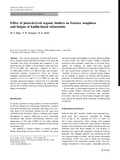| dc.contributor.author | Njogu, MS | |
| dc.contributor.author | Nyongesa, FW | |
| dc.contributor.author | Aduda,B O | |
| dc.date.accessioned | 2013-06-15T07:17:49Z | |
| dc.date.available | 2013-06-15T07:17:49Z | |
| dc.date.issued | 2008 | |
| dc.identifier.citation | Journal of Materials Science June 2008, Volume 43, Issue 12, pp 4107-411 | en |
| dc.identifier.uri | http://link.springer.com/article/10.1007/s10853-008-2533-1 | |
| dc.identifier.uri | http://erepository.uonbi.ac.ke:8080/xmlui/handle/123456789/34214 | |
| dc.description.abstract | The fracture properties of kaolin-based refractories prepared using plant-derived binders from okra and “mrenda” have been investigated and compared. It was observed that the MOR of fired samples improved from 37.5 ± 0.1 MPa (for binder-free samples) to 69.6 ± 0.1 MPa, and to 120.0 ± 0.1 MPa for okra- and ‘mrenda’-plasticized samples, respectively, while the fracture toughness increased from 3.9 ± 0.1 MPa (for binder-free samples) to 5.6 ± 0.1 and 5.7 ± 0.1 MPa for okra and ‘mrenda’-plasticized samples, respectively. It is concluded that the use of organic binders enhances the reliability and service life of kaolin refractories used in thermally fluctuating environments | en |
| dc.language.iso | en | en |
| dc.title | Effect of plant-derived organic binders on fracture toughness and fatigue of kaolin-based refractories | en |
| dc.type | Article | en |
| local.publisher | Department of Physics, University of Nairobi, | en |

